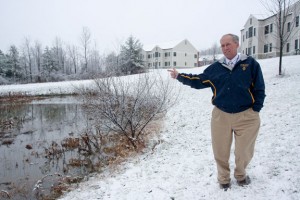Plans to complete the expansion of the Circle Apartments complex have been pushed to Summer 2012 because of the unexpected presence of wetlands. Originally scheduled to be completed August 2011 to accommodate the large sophomore class, the number of planned new occupancies has also been cut in half.

The U.S. Army Corps of Engineers declared the land unsuitable for immediate expansion because of the presence of these wetlands. If these saturated areas of moisture are disturbed, wetlands of equal or greater size must be created in other locations on the college’s property.
According to the New York State Department of Environmental Conservation website, the Army Corps monitors all activity regarding freshwater wetlands in order to protect them, as they provide many benefits such as flood and storm water control. Wetlands are identified under the Freshwater Wetlands Act as being an area of land 12.4 acres or larger with standing water.
Carl Sgrecci, vice president of finance and administration, said the drainage soils put in place to prevent possible future flooding during the Circle Apartment expansion of 2002 are what the Army Corps is declaring as wetlands.
“Rather than having just holes in the ground, we planted some grasses to sustain a temporary flooding,” Sgrecci said. “When we came back to do the new expansion, the Army Corps declared what we had done as new wetlands.”
Rick Couture, associate vice president of the office of facilities, said the college suspected the drainage soils became wetlands while it was making plans for the expansion with an environmental specialist this year.
“The Army Corps came out and inspected the area we had pointed out as question marks in our minds, and now we are working with them because they are preliminarily telling us, ‘Yes, those are wetlands,’” Couture said. “We’re seeing where we would propose to build new Circle Apartment buildings where they wouldn’t impact wetlands.”
In addition to the wetland issues, Sgrecci said the college is working with the New York State Department of Transportation, which is concerned the additional occupancy at the apartments will increase traffic on Route 96B.
“We don’t know that this will happen yet, but they’re looking at whether or not we might have to put in a left-hand turn lane going into the apartments and whether or not there should be a traffic signal at the entrance,” Sgrecci said. “All of these things unfortunately take time to resolve, and you can’t start until they’re resolved.”
Koenig said in spite of the expansion delays, the college still guarantees on-campus housing for the sophomore class, but it’s likely they will have difficulty getting their preferred choice of housing.
“Everyone who is here on campus will have a space to live in next year,” Koenig said. “We guarantee housing for all four years and are required to for three. But it will be just as competitive as it has been in years past, possibly more so.”
The expansion project’s original goal was to have the first half of the new occupancies, 140 beds, ready for August 2011 in order to serve the large number of students in the sophomore class. Sgrecci said the college missed the opportunity to have the new apartments ready in time for their junior year.
The college reevaluated whether it wanted the beds on a long-term basis after looking at the smaller class that entered this fall and projected similar size classes in years to come. To help ensure space for future years, Sgrecci said the college decided to create a total of 136 new occupancies for Summer 2012.
“It appears to us that the 136 beds is what we will need on a long-term basis,” Sgrecci said. “It isn’t a matter of changing priorities, it is simply one of what we can realistically achieve in the time we have available to us. There shouldn’t be any major inconvenience.”
Part of the new expansion process involves taking down the 13 two-person apartments next year and permanently replacing them with more four-person apartments.
In addition to more beds, the new expansion process will change the Community Building to also include larger fitness and laundry rooms as well as a small retail store.
Linda Koenig, assistant director for housing services and communication, said she does not see this posing more of an impact on sophomores.
“[The expansion] will have an impact in the sense that the two-person apartments [are] an option for students that won’t be available anymore,” Koenig said. “Hopefully the process of adding more beds to the Circle Apartments in the future will be worth the loss of those for the year. The four-person apartments tend to be the most popular, so those are the ones we’re adding.”
Koenig said there is a possibility incoming students will have to live in dorm lounges again but that it depends on how many students live off campus next year. Currently, fewer than 50 students live in lounges, and Residential Life hopes to relocate them to permanent housing in January.
Sophomore Emily Germain said she found out about the expansion delays through a friend but had decided to live off campus for the 2011-12 school year before.
“I have an apartment all set up for next year that’s cheaper than living on campus by a couple thousand dollars,” Germain said. “It’s also easier to move off campus elsewhere since there are so little apartments available on campus and not deal with the overcrowding.”
Koenig said the college will evaluate what, if any, incentives will be offered to students once it is determined if there is enough housing.
“The plan is to never have students living in lounges, but the reality is that we need to be able to accommodate people,” Koenig said. “If all things work out well and we’re able to release the number of students necessary to live off campus, we should be able to accommodate everyone properly.”







